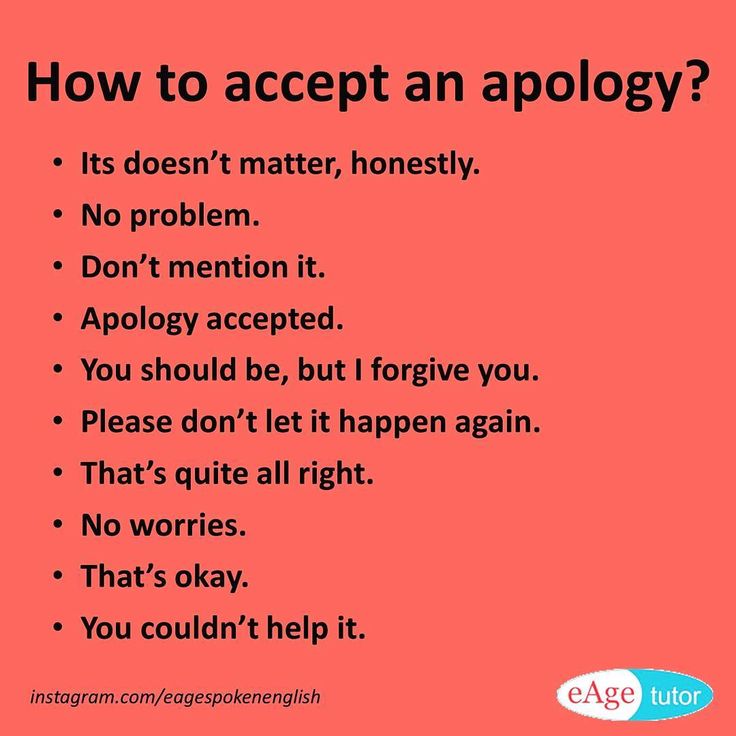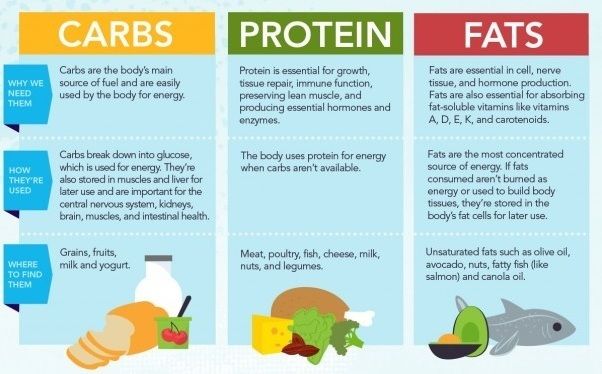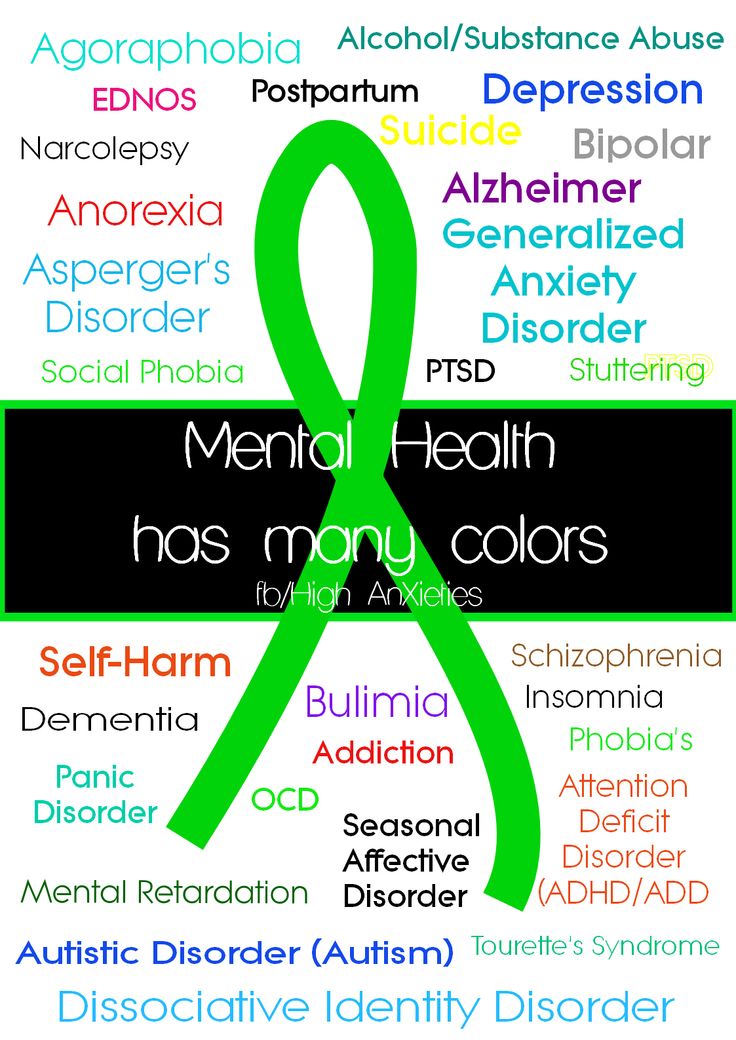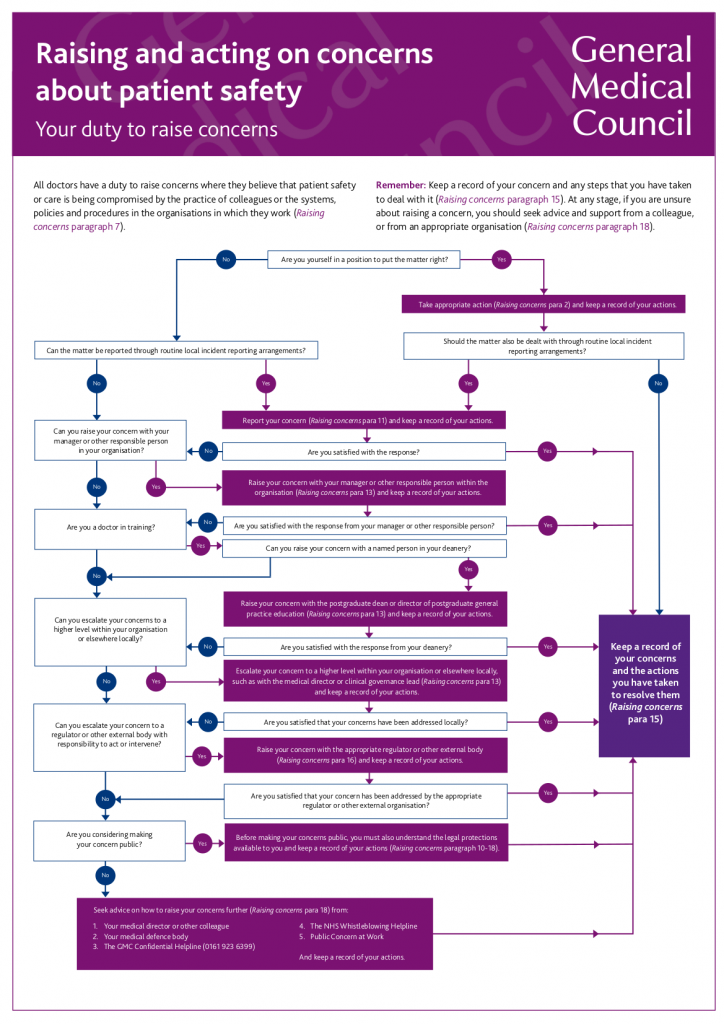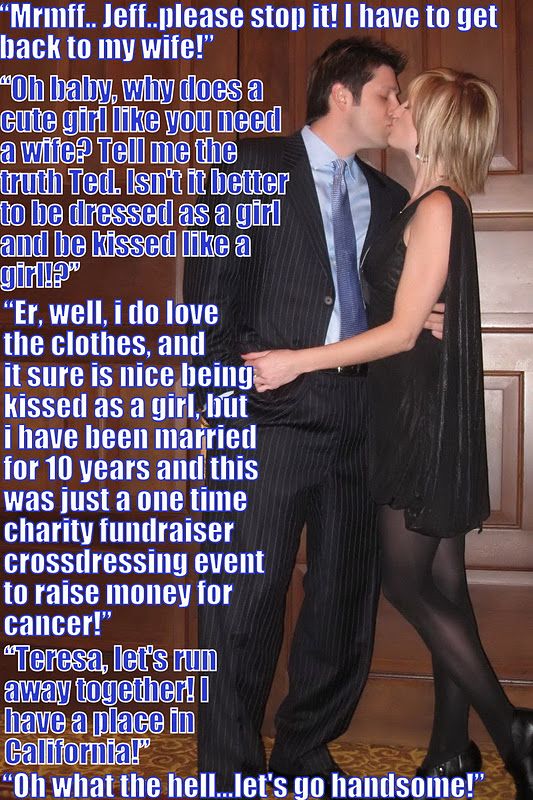How to accept an apology when you are still mad
How to Respond to an Apology: Step-By-Step
Responding to an apology can be challenging, especially if you aren’t ready to accept it. Someone may try to say “I’m sorry” for something that happened after a tragic death. Or a person might apologize quickly and try to smooth things over. How do you handle these moments without defaulting to, “It’s OK,” when it really isn’t?
Here's how to accept an apology:
- Step 1: Listen to the Apology
- Step 2: Decide if You Are Ready to Accept the Apology
- Step 3: Acknowledge Their Apology
- Step 4: Give Your Response
- Examples of How to Respond to an Apology or ‘I’m Sorry’
Apologies can create uncomfortable, awkward moments, so it’s easy to feel rushed into accepting one before really thinking about it. Here, you’ll learn more about how to listen and evaluate an apology before responding. A small amount of time can make a world of difference when a relationship is under stress.
Step 1: Listen to the Apology
Find a quiet location with few distractions and prepare yourself to listen. Regardless of how ready you are to hear the apology, listen carefully with open ears.
Try to avoid reacting or interrupting and allow their apology to stand on its own. You will have plenty of time to respond after they finish speaking.
Step 2: Decide if You Are Ready to Accept the Apology
Once you’ve heard the apology, you get to decide whether you’re ready to accept it. It’s kind and respectful to acknowledge a person’s apology when they offer it, but you are not obligated to accept it. These questions can help you decide how to respond.
Does it seem sincere?
Body language can betray a person who isn’t apologizing sincerely. If they seem impatient or have a defensive posture, they may not be giving you an honest apology. Eye contact, a sincere tone of voice, and lowered head are signs of humility and remorse.
Does it include “but” or “however”?
These two words can often cancel out an apology. It’s lip service to try smoothing over the problem. Anything a person says after, “but,” or, “however,” does not fully acknowledge their actions or your pain.
It’s lip service to try smoothing over the problem. Anything a person says after, “but,” or, “however,” does not fully acknowledge their actions or your pain.
Do they acknowledge the pain they caused you?
Some people apologize by saying how awful they feel and don’t say much about the person they’re speaking to. An apology that recognizes your emotional pain is worth remembering. You need to know the other person honors your emotions before moving forward.
Do they accept responsibility for their actions?
This part is critical. For an apology to be acceptable, the other person must show they understand how their actions caused you pain. When you hear them accept personal responsibility, you have a chance at repairing the trust between you.
Do they want to move quickly past the apology and return to normal?
If they skip through the apology and try to act like everything’s normal, step back and take a breath. Their apology may be an attempt to get out of an uncomfortable situation and save face. You have reason to be doubtful.
You have reason to be doubtful.
Are you ready to move forward?
It is 100 percent OK if you aren’t ready to accept the other person’s apology at the time they offer it. Even if they are sincere and ready to make amends, you may need more time. And if you aren’t able to accept it now, say that clearly.
Step 3: Acknowledge Their Apology
It’s always appropriate to acknowledge someone for making a genuine effort. Regardless of your response, start by thanking the other person for gathering their courage and speaking up. If you have hopes of repairing your relationship, your respect and kindness are critical now.
The other person may have hurt you, but you won’t improve anything by being hurtful in return. When both of you act in good faith, you set the stage for honest communication.
Step 4: Give Your Response
You aren’t obligated to accept an apology just because someone offers it. It’s up to you to decide whether the time is right.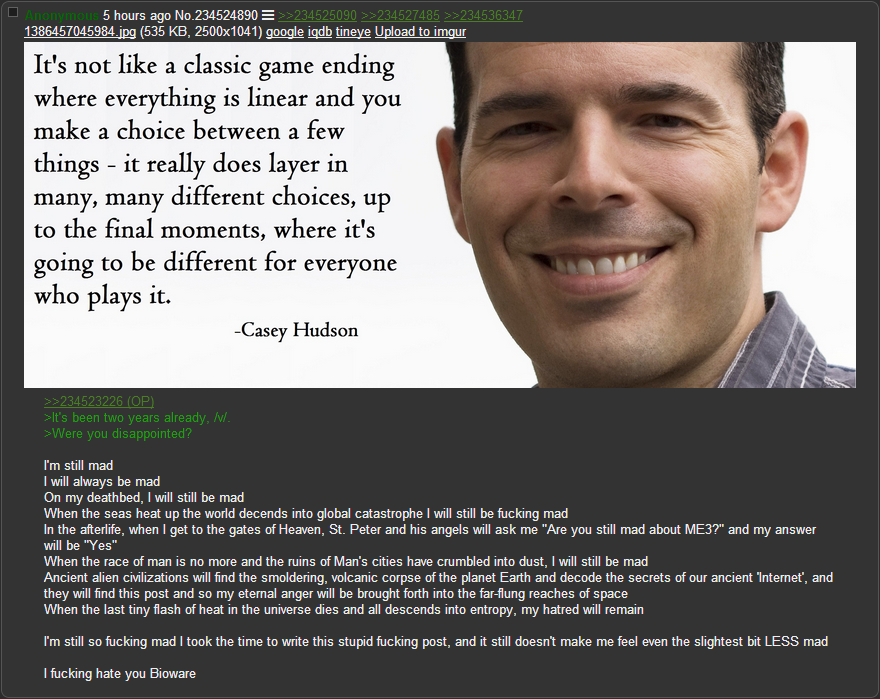 The following list offers up several kind and respectful responses you can give depending on your situation.
The following list offers up several kind and respectful responses you can give depending on your situation.
It’s OK
We often say, “It’s OK,” far too often when someone apologizes. It’s easy to say and helps us avoid feeling uncomfortable. But often, a more detailed reply is better for addressing emotional pain and restoring trust. Reserve the, “It’s OK,” answer for times when the other person’s actions have almost no effect on you or create a minor mishap.
Acknowledge their effort while remaining uncertain
It takes guts to offer an apology, and this effort is worth recognizing. You can acknowledge a person’s effort to apologize without accepting it or offering forgiveness in return. Don’t feel pressured to accept an apology without being sure that you’re ready.
Thank the person for reaching out to you. If you aren’t sure about your next step, tell them you need more time to think about it. Regardless of their reaction, remain calm and kind.
Accept the apology
When you’re ready to accept someone’s apology, you can move forward with the relationship. It does not necessarily mean you have forgiven them or put the problem behind you. That step may take more time to unfold.
It does not necessarily mean you have forgiven them or put the problem behind you. That step may take more time to unfold.
By accepting the apology, you acknowledge that what the other person offered was sincere and with positive intent. You believe they are willing to repair the trust between you and make up for what they did wrong.
Don’t accept the apology
You may not be ready to accept their apology right now, or you may not believe it’s sincere. If you can’t accept it, thank them and state that you appreciate what they’ve said. Some emotional wounds heal slowly, so it’s reasonable to take your time with this if you aren’t sure yet.
Examples of How to Respond to an Apology or ‘I’m Sorry’
Apologies can happen in a variety of situations. Sometimes you may be dealing with other issues or aren’t emotionally ready to discuss the situation. Take a look at how these apologies are handled differently in each circumstance.
If someone’s apologizing after a death or tragic event
When tragedy strikes, grief can become overwhelming and complicated. If someone apologizes to you during this time, suggest reconnecting later. You won’t be able to process an apology clearly when you’re still in the early stages of grief.
If someone apologizes to you during this time, suggest reconnecting later. You won’t be able to process an apology clearly when you’re still in the early stages of grief.
- “Thank you for reaching out to me. I’m still dealing with a lot right now, so we’ll need to talk more later.”
- “I appreciate hearing from you, but I can’t process this right now. I just need more time to get past some of this.”
If you’re still hurt, mad, or upset
If you’re still hurt or upset by someone’s actions, be open about this. Let them say their apology and acknowledge their effort, but be clear that you aren’t fully ready to move forward yet. Commit to revisiting it later after letting your emotions settle.
- “It’s good to hear you apologize, but honestly, I’m still pretty hurt by what happened. I’m just not ready.”
- “I hear what you’re saying, and I’m sure it wasn’t easy to talk to me. I’m still angry and dealing with the fallout from what happened.
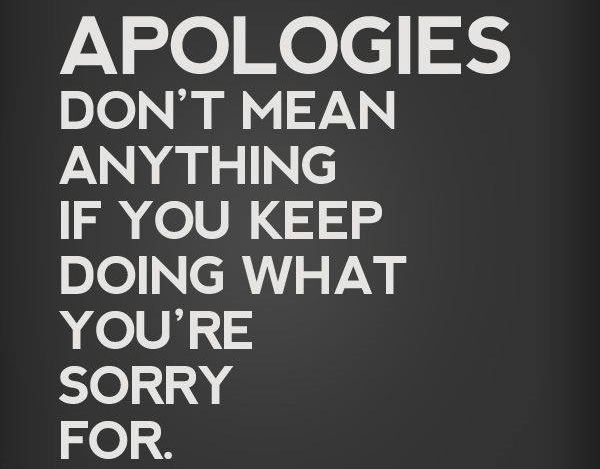 We’ll have to talk another time.”
We’ll have to talk another time.”
If you accept their apology
To accept an apology, you should feel that it was sincere and that the other person took full responsibility for their actions. If you feel satisfied and are ready to move forward, these responses are good ways to start the next step. Accepting an apology is not the same as forgiveness, so only say that if you are ready to let go of the issue.
- “Thank you, and I accept your apology. Let’s talk about how this goes differently from now on.”
- “Thanks for your apology, and I accept. I forgive you and am ready to let this go.”
If you need more time
Apologies don’t always happen at the right time for both people. If someone apologizes but you need more time, be honest about this. Listen first and then make it clear that you still aren’t able to accept it right now.
- “I hear you, and it’s good to listen to your apology. But this is a little too soon for me.
 I’m not ready to talk about this, and I just need some time. We can talk later.”
I’m not ready to talk about this, and I just need some time. We can talk later.” - “I understand, and it looks like you’re ready to resolve this. I wasn’t expecting an apology now, so I need more time to think about it. But thanks for saying something.”
If you think the apology is insincere
Sometimes a person apologizes before they are ready to accept responsibility. If you think they aren’t sincere, tell them you can’t accept their apology now and be clear about your reasons. Let them know what was missing in their apology and what they need to show you in the future.
- “I understand, but it doesn’t seem like you mean it. You’re rushing through it, and it doesn’t seem like you’ve thought about it much. I can’t accept your apology right now.”
- “I hear you, but I’m not sure I believe you. You seem to feel bad, but I don’t hear you taking any responsibility yet. Maybe we can talk another time.”
Moving Forward After an Apology
Creating a sincere apology takes effort, and so does responding to one. Resist the knee-jerk reaction to say, “It’s OK,” and consider a more genuine answer. Responding thoughtfully to an apology helps you know when you’re ready for the next step.
Resist the knee-jerk reaction to say, “It’s OK,” and consider a more genuine answer. Responding thoughtfully to an apology helps you know when you’re ready for the next step.
Sources
- Grabmeier, Jeff. “The 6 Elements of an Effective Apology, According to Science.” Ohio State News, April 12, 2016, news.osu.edu/the-6-elements-of-an-effective-apology-according-to-science/
- Hatcher, Ida. “Evaluations of Apologies: The Effects of Apology Sincerity and Acceptance Motivation.” Marshall Digital Scholar, January 1, 2010. mds.marshall.edu/cgi/viewcontent.cgi?referer=https://www.google.com/&httpsredir=1&article=1630&context=etd
How to Respond to an Apology when You Are still Hurt
Politeness Theory tells us that when someone apologizes to us, we feel like we have to respond by telling them we forgive them.
This can be tricky if we do not actually want to forgive them.
Instead of always saying, “I forgive you, it’s okay,” and then going home in anger because we had to swallow our hurt, we should try to be genuine about how we feel.
Here are fifteen possible ways to respond to an apology when we still feel hurt by what has happened.
15 ways to respond to an apology when you are still hurt
- I’m not ready to forgive you yet. I’m still deeply hurt. I need a bit more time to think things through before we start talking again.
- Thanks for apologizing. I needed to hear that because I am still very hurt by what you did.
- Thanks for saying that. I appreciate the apology, but it will take me some time before I’m ready to forgive you.
- I’m really glad we had this talk. I know it must have been hard for you to apologize. Unfortunately, I’m still not quite ready to move on yet. But I’ll get in touch when I feel ready to talk.
- I appreciate what you’re saying, but until I see a change in your behavior, I won’t be ready to forgive you.
- I’m so glad you came to talk to me.
 I’m still hurt, but I accept your apology. Let’s leave this in the past.
I’m still hurt, but I accept your apology. Let’s leave this in the past. - Thank you for your apology. I’m still hurt, but I’m ready to try to move on.
- That apology means a lot to me. I still feel betrayed, but I would like to work through this with you.
- Thank you for acknowledging the way you hurt me. I appreciate your efforts to repair things. Let’s see if we can leave what happened behind us now.
- I’m grateful for the apology. I can forgive you, but I won’t forget.
- What you did was so unacceptable that I don’t think I will ever be able to forgive you.
- I hate to say this, but I don’t think I want to repair this relationship. What you did was so hurtful that I doubt I’ll ever be able to move past it.
- That apology does not acknowledge the level of hurt you caused me.
- I think it’s best if we don’t talk anymore.
 I don’t see myself getting over what happened.
I don’t see myself getting over what happened. - I appreciate that you are trying to apologize and fix things, but that isn’t what I want. I would prefer it if we just went our separate ways.
How to respond to an apology if you are not ready to forgive yet
It is difficult to forgive someone who has hurt you deeply. And, the truth is, you don’t have to accept every apology you get.
For example, when a friend ghosts you, you don’t have to forgive them right away.
After all, forgiveness that isn’t genuine isn’t forgiveness at all.
Instead of just automatically accepting every apology, take the time to listen to the person apologizing and decide whether you can really move on.
If you think you will be able to forgive one day, but aren’t ready to accept an apology yet, tell the person who has wronged you that while you appreciate the “sorry,” you need more time to work through things.
1. I’m not ready to forgive you yet. I’m still deeply hurt. I need a bit more time to think things through before we start talking again.
In any situation that involves confrontation, it is important to be as clear as you possibly can. After all, words can get twisted and misconstrued.
If you are still too hurt to an accept an apology, state your position as concisely as possible.
Tell the person apologizing to you that you can’t forgive them yet. You are still hurt. You need more time.
This message is sure to be understood.
2. Thanks for apologizing. I needed to hear that because I am still very hurt by what you did.
Even though you may not be able to accept an apology yet, it doesn’t hurt to thank the apologizer for saying sorry. You could even tell them you needed to hear it.
Don’t shy away from an honest assessment of how you feel about what went down. If you’re hurt, let the person who hurt you know.
3. Thanks for saying that. I appreciate the apology, but it will take me some time before I’m ready to forgive you.
You may feel that you need time before you’re ready to forgive. If so, tell the person apologizing to you that you need some space before you commit to trying to repair your relationship.
4. I’m really glad we had this talk. I know it must have been hard for you to apologize. Unfortunately, I’m still not quite ready to move on yet. But I’ll get in touch when I feel ready to talk.
The tricky thing about the people who hurt us is that that they are usually people we are close to. After all, you have to be close to someone to feel betrayed by them.
This means that we sometimes find ourselves hating someone’s behavior even though we still love them.
You may want to show compassion for someone who has hurt you because you still care about them. If so, tell them you understand how difficult it must have been for them to apologize and thank them for taking the time to talk.
That said, just because you can understand what they must be feeling, doesn’t mean you have to invalidate your own feelings by agreeing to forgive them. Instead, tell them that you aren’t ready to move on and will get in touch when you are.
5. I appreciate what you’re saying, but until I see a change in your behavior, I won’t be ready to forgive you.
Sometimes words are not enough. What’s that expression? Oh yes, talk is cheap.
If the person who hurt you is good at saying all the right things but then consistently fails to change their behavior, tell them actions speak louder than words.
When they apologize, let them know that you can’t forgive them until their actions show you that they mean what they say.
How to respond to an apology if you want to try to move on
If someone apologizes to you and you are still hurt, you have a few choices.
One is to tell them that you are not over what happened, but that you are willing to try to work through things.
By agreeing to try to move on you are not signing away your right to feel sad or angry about what happened, you’re simply indicating that you would like to find a way to work through those emotions.
6. I’m so glad you came to talk to me. I’m still hurt, but I accept your apology. Let’s leave this in the past.
No matter how hurt you are, if you love the person who has hurt you, it is worth at least showing a willingness to fix things.
Make it clear that even though you accept their apology, you are still hurt. You are not guaranteeing them a blank slate, you are simply saying that you would like to find a way through the difficulty.
7. Thank you for your apology. I’m still hurt but I’m ready to try to move on.
Keep your response to an apology short and sweet. If someone apologizes and you want to move on and stop re-hashing things, then thank the person who hurt you for their apology.
Tell them in no uncertain terms that you are still hurt but would like to move past it.
Whether the person apologizing is an ex wanting to know how you are, your mother, or your former closest friend, as long as they are truly sorry, there is no harm in trying to move past what has happened.
8. That apology means a lot to me. I still feel betrayed, but I would like to work through this with you.
A sincere apology is a beautiful thing.
We are all only human and we all make mistakes. If we know we’ve messed up, the best thing we can do is reflect on our behavior and then say sorry to the people we have hurt.
If you feel that someone is truly remorseful for their actions, tell them that while you still feel betrayed, you’d like to try to work through things.
9. Thank you for acknowledging the way you hurt me. I appreciate your efforts to repair things. Let’s see if we can leave what happened behind us now.
Some people simply say sorry, while others go the extra mile to try to demonstrate that they want to make things better.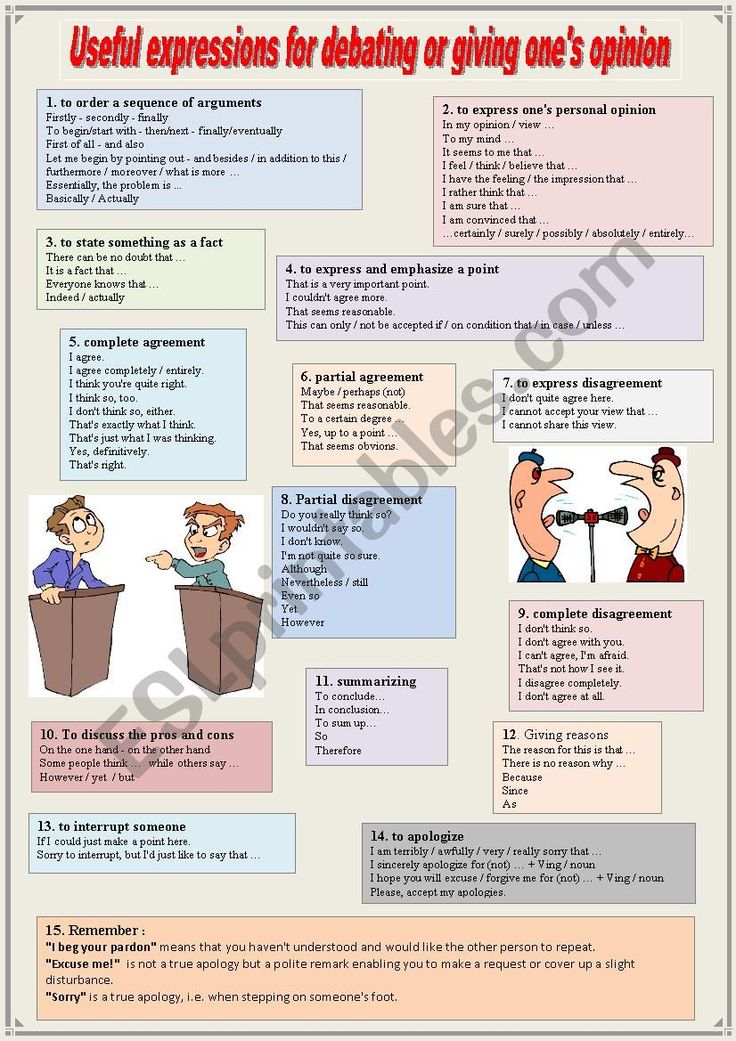
For example, if your partner has hurt you, they may buy you flowers, empty the dishwasher consistently, or cook you breakfast in bed.
If you feel that someone is fully invested in making things up to you, you can say “I appreciate your efforts to repair things.”
If someone feels that you appreciative of their efforts, they will be more likely to continue to try to show you just how remorseful they are.
10. I’m grateful for the apology. I can forgive you, but I won’t forget.
One of the all-time great adages in the English language is “forgive, but don’t forget.” This is a variation of the older adage “forgive and forget.”
The second phrase means to forgive and move on, as in, try not to dwell on the thing that hurt you.
The first one, on the other hand, encourages us to let people who hurt us back in our lives, so long as we remember what they did and remain wary of them in the future.
If you want to forgive someone but also want them to know that you won’t tolerate it if they make the same mistake again, say that you will “forgive but not forget. ”
”
How to respond to an apology if you don’t think you will ever be able to forgive
There are some offenses too egregious to be forgiven. For example, could you forgive a partner who cheated on you with your closest friend? Could you forgive someone who maliciously ruined your career prospects?
There is such a thing as a toxic relationship and there are also toxic friends. The best thing to do if you are in a toxic situation is to cut people out of your life.
If the person apologizing to you has done something unforgivable, let them know that you are too hurt to forgive them, and that you no longer want to have a relationship with them.
11. What you did was so unacceptable that I don’t think I will ever be able to forgive you.
This response is clear and to the point.
Not only do you state why you can’t forgive the person apologizing to you, but you send a clear message that they should not contact you anymore.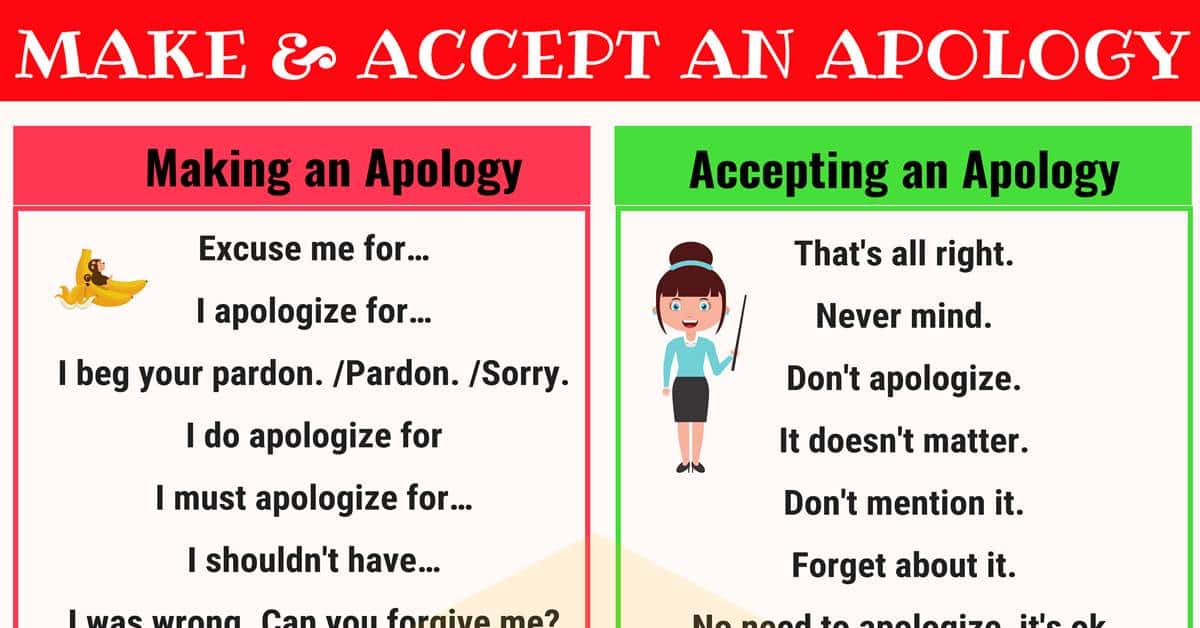
12. I hate to say this, but I don’t think I want to repair this relationship. What you did was so hurtful that I doubt I’ll ever be able to move past it.
When someone apologizes, it is usually because they know they have done something wrong.
In fact, many people who apologize aren’t sure they will be forgiven, and they have no right to expect to be.
You should not feel bad if you cannot forgive someone. After all, they have made their bed, and now they must lie in it.
13. That apology does not acknowledge the level of hurt you caused me.
Imagine staring at phone screen, typing and re-typing a message, trying to come up with a way to respond to a breakup text.
“How can they have thought it was okay to break up with me over text?” you wonder.
If someone does something that callous and thinks a simple “sorry” will fix the problem, feel free to let them know that the apology does not match the crime.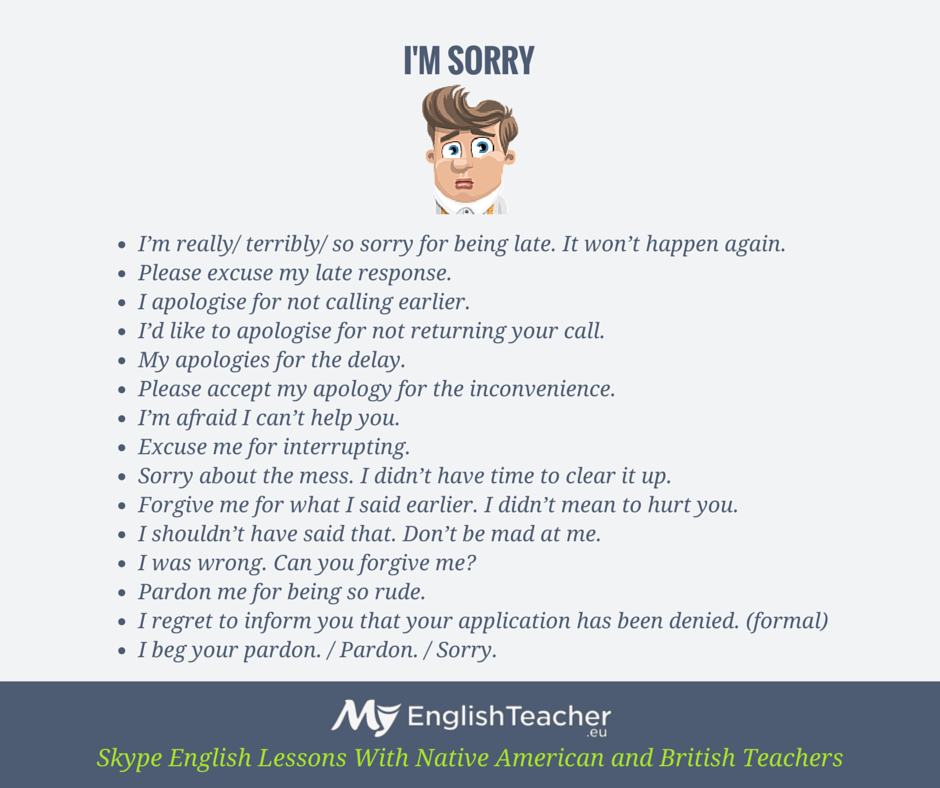
Saying that an apology doesn’t acknowledge the level of hurt you feel sends a clear message that you are not willing to engage with the person who wronged you.
14. I think it’s best if we don’t talk anymore. I don’t see myself getting over what happened.
Getting hurt by someone can make us feel really small and insignificant. When we feel betrayed, we feel that we must not matter very much to the person who hurt us.
One way to get over the feeling of being worthless that can sometime arise when we’re hurt, is to be assertive.
Instead of accepting a lackluster apology when you are truly hurt, define your boundaries to the person apologizing and tell them you don’t want to talk to them anymore.
15. I appreciate that you are trying to apologize and fix things, but that isn’t what I want. I would prefer it if we just went our separate ways.
Even if you believe that the person apologizing to you is sincere, that doesn’t mean you have to accept their apology. If you don’t want to talk to them anymore, tell them this.
If you don’t want to talk to them anymore, tell them this.
Let them know you appreciate their desire to fix things, but that you don’t want to smooth things over with them and would rather end your relationship here.
Steven
Hey, it’s me, Steven. Dating and relationships have always fascinated me. On Dategosu, you will find my best tips to make sure your next date is a great success!
90,000 psychologist Blog: how to learn to forgive and apologize- Elena Savinova
- Psychologist
Author photo, Nikuliahin/Getty
"harder" sorry ", it seems, no word," sung in a somewhat sad lyrical song. Indeed, sometimes it is unbearably difficult to apologize. And even harder to forgive.
- Why do we want to take revenge?
- How to learn not to believe in tears?
- Psychologist's blog: is it necessary to get into the soul and phone of a loved one?
- Psychologist's blog: why do we tell lies?
Against whom are we friends?
For someone to ask for forgiveness means to humiliate themselves. Say, it's useless, because you can't fix anything anyway. For other, more frivolous people, it's child's play.
Say, it's useless, because you can't fix anything anyway. For other, more frivolous people, it's child's play.
Some people think that they can do whatever they want and then apologize - and it's like nothing happened. Such people are sincerely surprised when they continue to be offended. After all, they uttered that cherished word.
Then they themselves are offended that they were not given something with the same ease with which they acted ugly. And accusations and resentments accumulate like a snowball. Although former friends no longer really remember who started it first, who owes what to whom.
I agree, the word "sorry" probably takes second place after "love" in terms of meaninglessness. Or vice versa - according to the fullness of all possible, often very contradictory, meanings. Saying "I love you" is partly about claiming, demanding, not working on the relationship anymore. And behind the words of forgiveness sometimes lies compulsion, indifference, neglect, hidden hostility.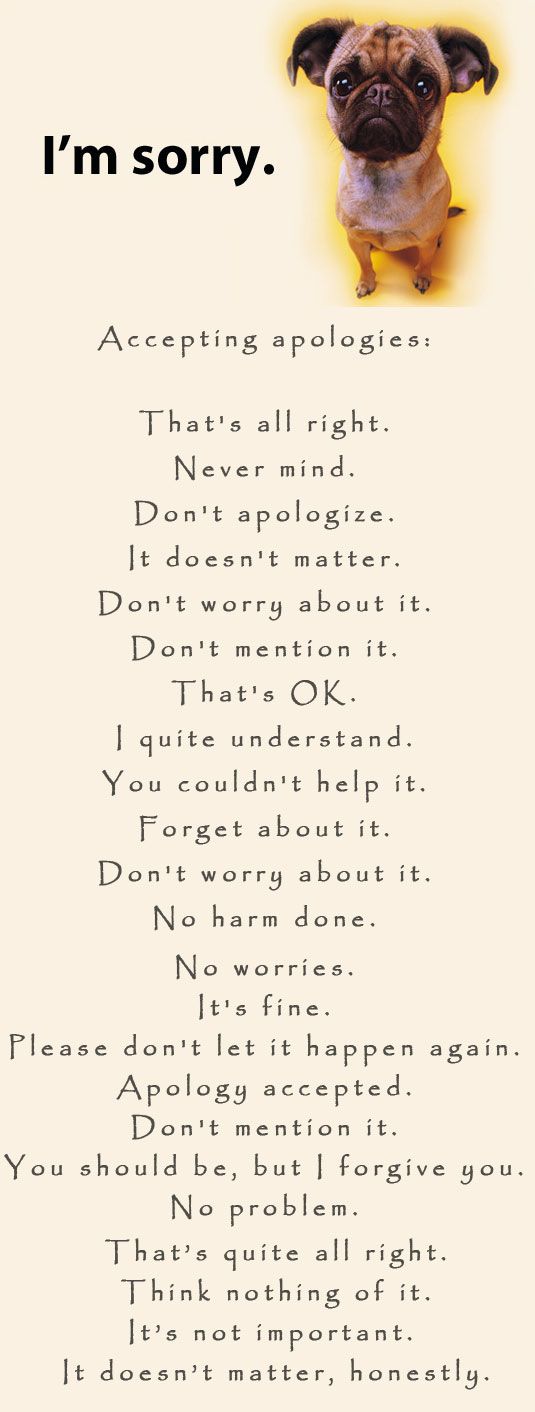
Some resort to a false apology to lull the enemy's vigilance and deliver a sensitive blow.
Petrenko is not a pig? I apologize...
Nevertheless, the very act of forgiveness is very important in human communication. By apologizing, you say that you recognize the fallacy of your act, you regret it. And also express the hope for understanding and the possibility of continuing the relationship. Since we are all different, our ideas of "good" and "bad" are different, so the ability to apologize will allow you to avoid unnecessary insults and enemies.
It is important to remember that you are asking for, not demanding, forgiveness. Therefore, you will have to calmly accept the unwillingness to forgive you for your oversight or unpleasant behavior.
Try to apologize immediately after the incident. Find out the reasons for the strange act of your friends here and now. Do not hide or accumulate resentment in yourself, drawing in your imagination their most incredible motives.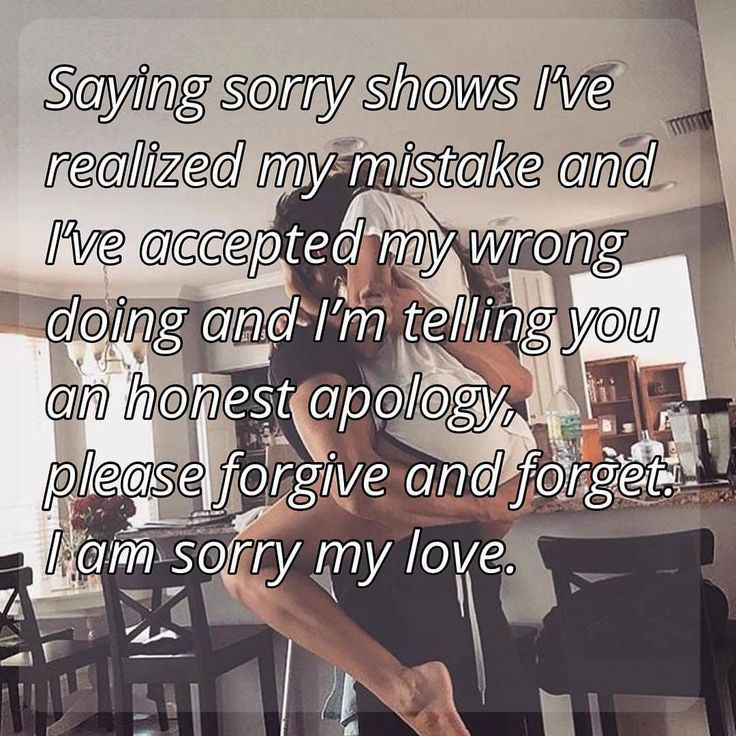
Let go
To be able to admit one's unworthy behavior with sincere repentance is a sign of a strong and adult personality. And to be able to really sincerely "forget" someone's deceit, dishonesty, indifference towards you - the highest aerobatics.
Image copyright Unsplash
There is an opinion that being offended is more profitable than being guilty. So many people like to feel offended. Firstly, in this way they find confirmation of their own children's complexes. As if no one loves them, everyone only takes advantage of their weaknesses. As if they are not capable of anything, so you can "wipe your feet" about them.
Secondly, those who once casually or even deliberately insulted them can be manipulated to their heart's content. For years, a wife remembers some kind of guilt for her husband in order to get behavior that is beneficial for herself.
Or the more successful, smart and beautiful one always feels a little guilty towards her "ordinary" friend because she is more "lucky". Therefore, he arranges a job for her, lends money, brings gifts. But once you refuse - and the benefactor turns into a sworn enemy.
Therefore, he arranges a job for her, lends money, brings gifts. But once you refuse - and the benefactor turns into a sworn enemy.
Offended by equals
So, if you have done everything possible, but they do not want to forgive you, stop trying. Before you is either a manipulator on guilt, or a collector of grievances, or a person has such a character that he leaves for a long time. Give him time and opportunity to take the first step towards you. If someone appreciates you and needs your company, they will find the strength to forgive.
However, if you are aware of your guilt, it would be dishonorable to wait until the offended person cools down on the principle "time heals everything". This is a sign of a weak-minded person who manipulates another's dependence on him.
Just as there is no need to pretend to be a superman, to whom all unpleasant words and deeds are indifferent. Therefore, resentment is also a sign of your indifference to another. And the stronger the connection between you, the more painful words and actions seem. Do not take offense at the weak and stupid.
And the stronger the connection between you, the more painful words and actions seem. Do not take offense at the weak and stupid.
Another thing is that the ability to forgive directly depends on self-esteem and self-confidence. The higher they are, the less vulnerable we are.
How to respond to an apology
Rubric: What to sayHere is a collection of words, phrases and expressions that will help you answer when you are asked for forgiveness, apologize. Each list item is a self-sufficient (complete, complete) response text.
Recommendations for selection are waiting for you at the end of the page.
- Apologies accepted.
- Okay, I hope you learn how to express your negative feelings in a non-offensive way.
- Where's the chocolate tea? You won't be able to make amends without them!
- I hope you will do your best to prevent this from happening again. For now, I consider this topic closed.
- No need to apologize.
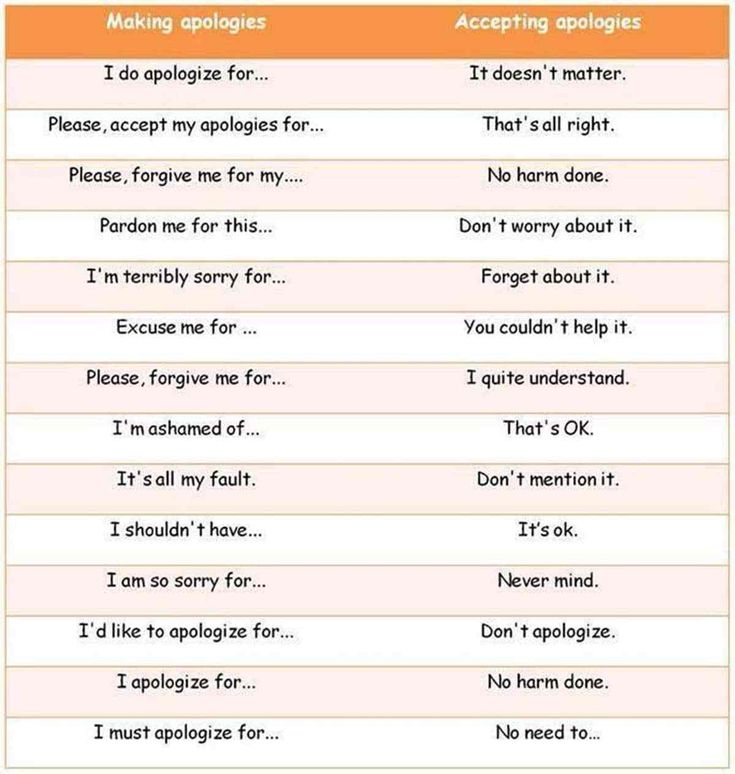 I will remember everything for you ... at wholesale prices.
I will remember everything for you ... at wholesale prices. - This situation is an isolated incident in your partnership and we hope it will remain so.
- I don't hold a grudge against you, but be careful next time.
- Don't worry, everything is fine.
- I heard you. I hope your common sense doesn't fail you anymore.
- Good. Let's now decide together how we will proceed in the future in such situations, so that we both feel comfortable.
- Unfortunately, your apology does not cover the damage. Do you now have the time and willingness to discuss ways to compensate for the damage done?
- It doesn't bother me anymore, don't worry.
- Thank you for your apologies, they will help me forget the offense.
- Do you have a session of memories today, rethinking what you have done and trying to bring back the past? Not sure if I want to take part in this.
- Don't worry about it.
- I see that your apology is sincere, but my budget does not include money to buy a new item (to replace the damaged / broken one).
 Maybe together we can think about how to be?
Maybe together we can think about how to be? - This is no longer a problem. Get it out of your head.
- I hope you will be better in the future?
- Your apology and the accompanying terrifying information will surely deprive me of sleep and appetite. If I've finished my presentation, I'll go about my business. Unlike you, I have no time to engage in chatter and torment.
- Don't worry. We all make mistakes.
- You apologize so touchingly that it would be unfair not to accept repentance from you.
- I'm sorry. But for the last time.
- Theories about what you did are interesting, but not convincing. I won't rush to apologize just yet, I need time to process what I've heard.
- It's all right. It's good that no one was hurt.
- I will not hide the fact that this still offends me. But I will try to erase the insult from my memory.
- Thank you for the explanation. I understood everything, and I am no longer angry.
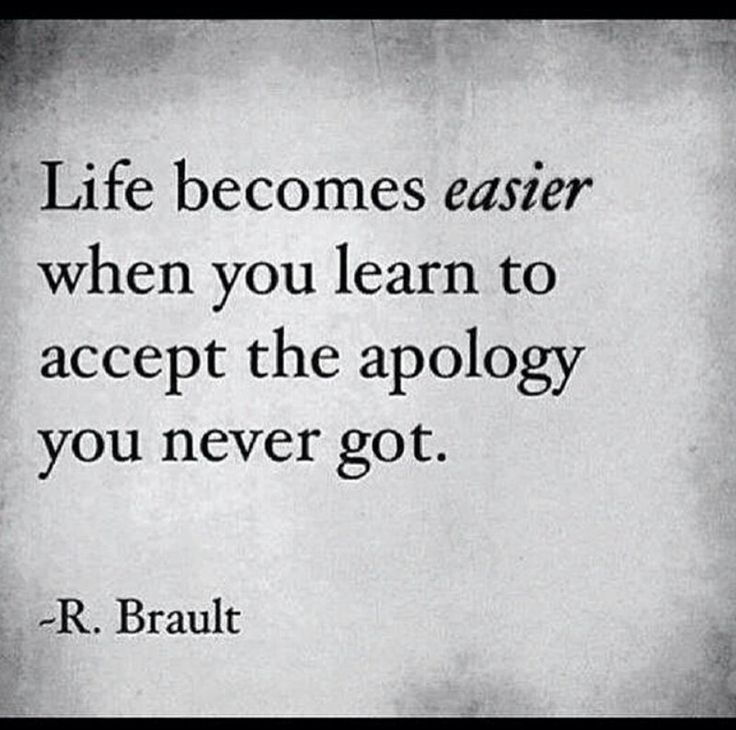
- I appreciate your remorse. It will help me quickly forget the misunderstanding that has arisen. I hope this doesn't happen again in the future.
- You'd better get your missing person status back. Only this time, forever!
- Don't worry. The main thing is that everyone is alive and well.
- Thank you for taking the trouble to explain and correct yourself. Let's forget about it.
- Let's start from scratch.
- Touched by your apology, but so far your repentance does not inspire confidence. I will allow myself to immediately forget about him and return to my business.
- Don't worry. I don't hold grudges.
- No problem!
- I promise to try to excuse you.
- Of course I forgive you.
- I am glad that you found the strength to admit your mistake and apologize. I forgive, but I can't forget yet. Therefore, I do not promise that our communication will continue in the same format.
- Don't blame yourself.
 It's just that both of us were unlucky, the circumstances were not in our favor.
It's just that both of us were unlucky, the circumstances were not in our favor. - Everything is fine, I already forgot!
- You just revealed another you to me. Now I'm even glad that this misunderstanding happened.
- These are small things. You didn't do anything terrible.
- Never mind, everything is fine.
- It's nice that you have a conscience. So I wasn't wrong about you.
- I am no longer angry.
- Would you forgive yourself?
- I am sincerely sorry that you have to apologize. It's not your fault what happened. There should be another person in your place now.
- No need to apologize. It was the result of a misunderstanding on both sides. Now we will know more about each other.
- Your worries are in vain. I'm not mad at you anymore.
- And forgive me for my intemperance. I was in a bad mood (feeling) that day, so I flared up.
- I forgive you with pleasure.
- Let's forget. Nothing could be changed there.
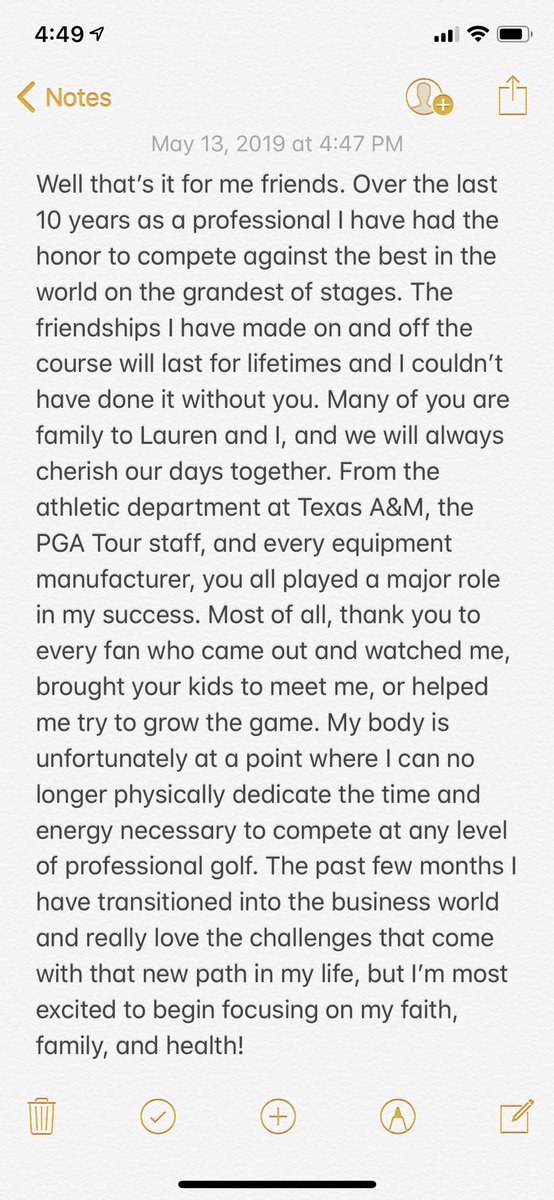
- Yes, today is a good day to forgive each other. I give you my forgiveness and I hope that you will be able to forget all the insults.
- I didn't take offense at you.
- I appreciate your attempt at reconciliation. I think we have reached an understanding. Let's discuss other questions now.
- Good. From that day on, it's all in the past.
- Didn't know that you could be tormented by remorse. I'll probably forgive you, but I won't be able to forget - this is not forgotten.
- Apologies accepted. And let nothing interfere with our friendship from today.
- I'll forgive you, but don't repeat this again.
- Of course, I will forgive you. Condescension to one's neighbor is one of the strengths of my character.
- Trivia. What was, is gone.
- Thank you for your remorse, it convinced me that I was dealing with a decent person.
- Okay, forget it. I can't be mad at you forever. Anything happens.
- I accept your apologies.
 I know that you didn't do it on purpose (without malicious intent).
I know that you didn't do it on purpose (without malicious intent). - I wasn't angry. You just thought.
- I agree to reconciliation. Hopefully this experience will make us both smarter.
- You are late. Forgiveness Sunday was yesterday.
- Apology accepted. It was unpleasant for me, but I will try to forget this incident as soon as possible.
- Thank you for telling me your thoughts about your own behavior. Now I will know what you thought about in your free time.
- Not ready to accept your apology yet. Perhaps we will return to this topic later.
- God will forgive!
- I hope you really realized that you were wrong. You can consider yourself forgiven.
- Okay, let's forget the old. I'm not an angel either.
- I am pleased that our relationship is dearer to you than pride.
- I am also sorry that it all happened. I'll try to forgive you, but I can't promise anything.
- God forgives and I forgive.

- Oh, you don't even have to apologize for these trifles.
- Good. Now I would like you to solve the issue of repairing the damaged item.
- I will remember your words for years to come…
- You look like a man reading his tax return aloud… I can't refuse your forgiveness.
- How beautifully and convincingly you apologize. When I have free time, I'll think about what to do with it...
- Just don't use so many questionable substances next time and you won't have to apologize.
- I'm sorry to be rude, but I hope I never see you again in my life.
- God forgave and commanded us.
- Okay, so be it, I'm sorry. I can't watch you tormented by guilt forever.
- Why are you looking at me as if you rang the doorbell and with the New Testament in your hands began to ask if I was ready to “let Christ into my life”? Of course, I am ready to restore peace and normal relations between us.
- And are you ready to compensate me for the cost of repairing the thing (broken by you)?
- Don't waste your energy on feeling guilty.
 I don't know how to be angry for a long time with those I truly love.
I don't know how to be angry for a long time with those I truly love. - You even apologize as a person who has a black soul. Kindly leave me and take your place in hell.
- I think it's unforgivable to continue torturing each other, we need to hurry to be happy again. It's good that you gave us both the opportunity and apologized. Trouble in the past.
- I understand you. I hope our friendship is strong enough to survive this situation. I will try very hard to deal with resentment, let it go and forgive you.
- Okay, I'm not angry anymore. And for God's sake, get out!
- I forgive and I say goodbye. I am the best thing in your life, and you are the worst thing in mine. And I'm fed up with this toxic relationship. Leave.
- I'm also sorry when a good person is ignited by a bad idea. Let's consider that we both got an invaluable experience that does not need to be repeated.
- Thank you for being able to apologize. I appreciate it.
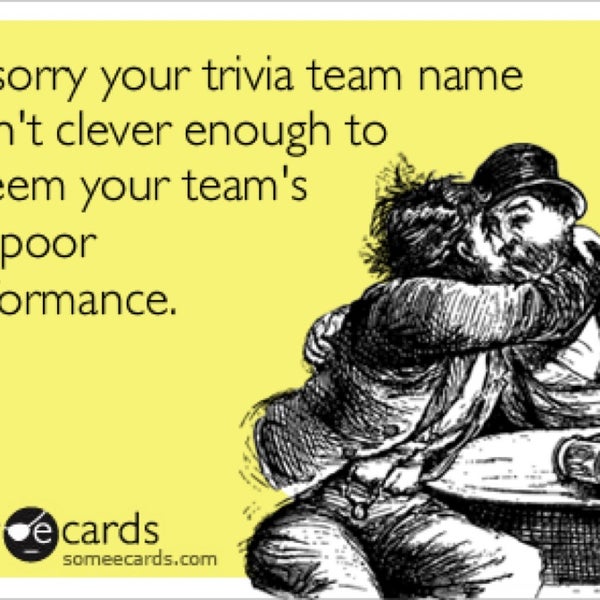
- I'll forgive you, but you won't get off with words alone. You still need to fix the situation (pay for the repair of the thing, buy a new one to replace the damaged one, etc.).
- What are you... I haven't had time to be offended yet, and you are already apologizing.
- I'm sorry. Everyone has the right to make a mistake, but not everyone knows how to realize it.
- Forgiveness is possible only after punishment. First, I will appoint a punishment, and then we will talk about your forgiveness. Ready to be punished?
- I consider the conflict resolved.
- Good. How soon can you fix what's broken?
- Yes, it's a pity that this happened. I need time to calm down.
- Apology accepted, but the issue of compensation remains open. I would like to resolve this issue as soon as possible - do not delay, please.
- This should be celebrated with cognac... Cognac is very conducive to expiation of sins.
- I guess I'll have to excuse you.
 Otherwise, I will earn a dubious reputation as a vindictive witch...
Otherwise, I will earn a dubious reputation as a vindictive witch... - It is impossible to be angry with you for long.
- I love reciprocity: how sincere your apology is, how sincere is my forgiveness.
- What indulgence do you expect from me: a hug or a kiss?
- Okay, let's give you a chance to improve. But there will be no second chance, I warn you.
- You can't spread an apology on bread or put it in your pocket. How are you going to atone for sins?
- Okay, we all learn from our mistakes. Only the smart ones learn from the mistakes of others. I hope we both get smarter in the future.
- This is not the first time... I would not want our relationship to be constantly marred by requests for forgiveness.
- Betrayal cannot be forgiven, but I will try.
- God will forgive, and it's not my job to arrange your meeting.
- I should think...
- Thank you for taking the step towards reconciliation, otherwise I did not know how to resolve this situation.
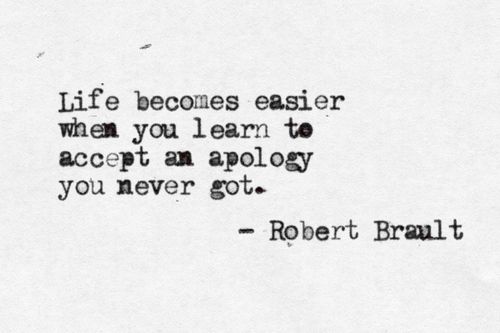
- I'm sorry, I have nowhere else to get forgiveness for you. You have exhausted your limit for a long time.
- Don't worry so much about the inconvenience caused. I took revenge on you a long time ago, you just haven't heard about it yet.
If you find it difficult to choose the best answer, the following recommendations will help you:
- An adequate assessment of guilt will help you choose the best answer. For example, if a person is only to blame for the fact that he unintentionally (due to circumstances, environmental conditions, etc.) bumped into you, then the phrases “It’s okay, you didn’t plan anything bad”, “Trifles, don’t worry!” , and the like - will be appropriate. In this case, the “guilty” didn’t actually do anything wrong, but he thinks he offended/insulted you. If a person spoiled (broke, rendered unusable, destroyed, lost, etc.) material things / valuables - the above answers will be relevant only in cases where the damaged thing had no significance for you, was not used and was not needed.
 However, by using these phrases (as if brushing aside the problem) in cases where material damage is caused by a child, you seem to inform him that things are worthless and, therefore, the culprit should not think about making amends and apologize - so you contribute to the formation in the child of an irresponsible attitude towards other people's property. As a result of such an attitude, he can more than once get into unpleasant situations already in adulthood (if this belief takes root in the mind).
However, by using these phrases (as if brushing aside the problem) in cases where material damage is caused by a child, you seem to inform him that things are worthless and, therefore, the culprit should not think about making amends and apologize - so you contribute to the formation in the child of an irresponsible attitude towards other people's property. As a result of such an attitude, he can more than once get into unpleasant situations already in adulthood (if this belief takes root in the mind). - In addition to the degree of guilt, determine whether (other than an apology) compensation is required from the culprit (in case of damage/loss of any property). If compensation for the harm caused is required, and the guilty person did not talk about it, choose those phrases that will turn the conversation in the direction you need (that is, phrases that include a reminder of the need to compensate for the damage). These phrases include: “Are you ready (a) to compensate me for the repair of the damaged item or will you make this repair yourself?”, “Good.
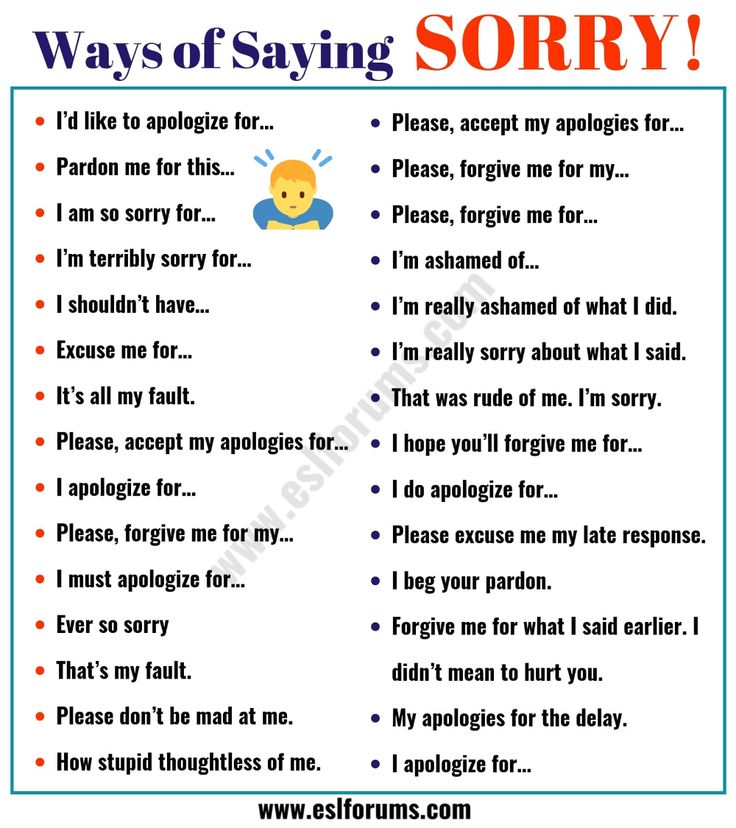 Now I would like to discuss the repair of a broken thing.
Now I would like to discuss the repair of a broken thing. - Also determine if you would like to develop a further relationship with the perpetrator. After you apologize, you don't have to keep the friendship with the person, but you don't have to end it either. In this case, the decision to resume or terminate the relationship depends on you, your desire, intentions, circumstances, etc. If you accept an apology, then you confirm your agreement to forget about what happened (according to the rules of etiquette).
- If, through the fault of a person, important plans were violated / did not come true, or his actions did not get the expected (and promised to you) result - choose such phrases to make him feel better (for example: “Don’t worry so much. After all, you did (a) everything in your power", "Let's forget. Nothing could be changed. But we got valuable experience", "The main thing is that we are all alive, healthy, no one was hurt").
- If the interlocutor does not apologize for the misconduct for the first time (here we mean significant "sins"), and continues to commit these misconduct, abusing your patience, and you no longer have the desire to endlessly justify and forgive him - choose a phrase that will communicate your distrust ( for example: “You do this all the time and this time my forgiveness is the last”, “You have repeatedly apologized and continue to let me down, so I do not forgive you now and will not forgive you in the future”).
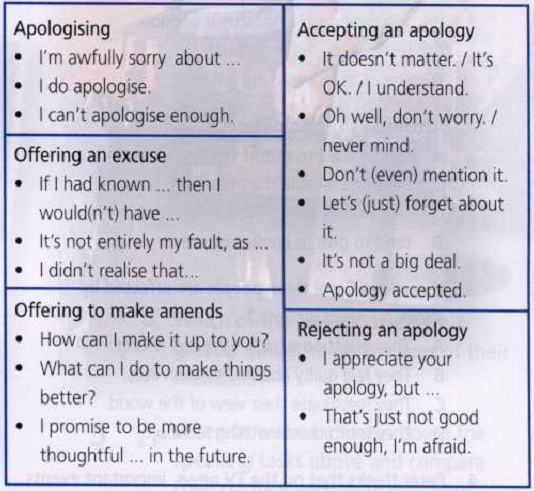
- If you have a desire to accept an apology, but are in doubt whether it is worth doing it, choose a phrase that will tell the interlocutor about your doubts and, perhaps, he will dispel them (for example: “Good. Let's decide how we will act in the future in such situations so that we both feel comfortable", "I'm afraid this won't be the last time. I think I'll be on my toes now waiting for the next such trick and I'm not sure if I need to forget this incident", etc.) . This is better than formally accepting an apology, but holding a grudge and pretending everything is fine.
- If you plan to maintain an even (friendly, family, professional, etc.) relationship, choose phrases that include gratitude for the apology (for example: “Thank you for finding the strength to admit the mistake, explain the misunderstanding and apologize. I appreciate your words ”, “Thank you for appreciating our friendship more than your own pride”, etc.). The offender will not only be pleased that you appreciated his courage, but also calmly - a settled problem reduces the feeling of internal anxiety, reduces the level of stress (for all participants in the situation).
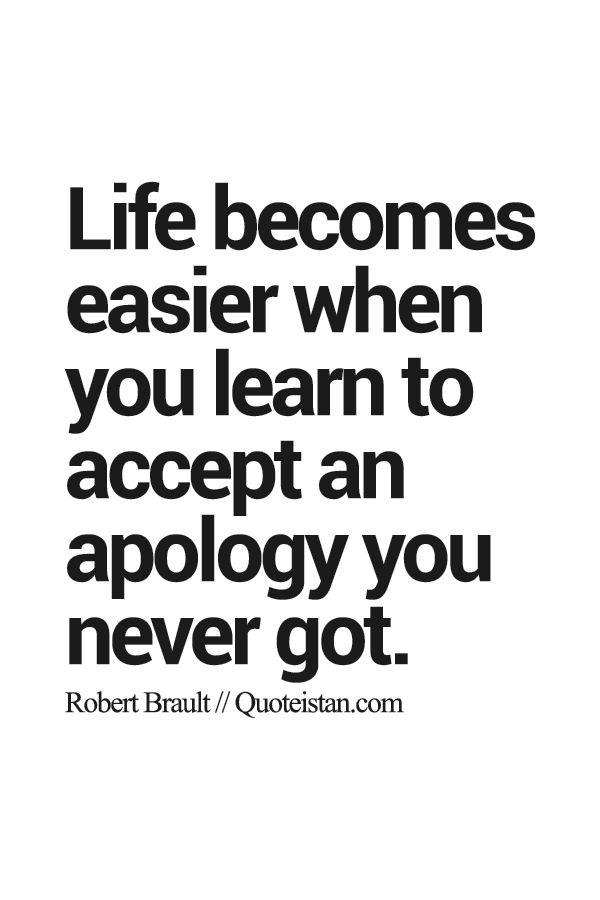
- If you have firmly decided that there can be no further relationship between you, you are not ready to forgive, and you are not interested in explanations, choose phrases that will inform your opponent about your intentions. However, when choosing sarcastic phrases, with subtext, ambiguous, make sure that the addressee (the one to whom you address your words) is emotionally stable, balanced, able to accept your answer without aggression.
- If you do not intend to accept an apology and assume that the culprit is emotionally unstable, unbalanced, short-tempered, aggressive, can harm himself or you (after refusal) - try to choose a neutral phrase for your answer that will not offend him, will not damage self-esteem, will not will cause an outbreak of aggression, resentment, etc. (that is, a phrase without sarcasm, ambiguity, harshness, rudeness, etc.). In this case, it’s better not to take risks, not to put pressure, not to aggravate the stressful situation, so as not to become the culprit of trouble yourself (such phrases include: “Thank you for your apologies, now it will be easier for me to forget the offense”, “Apologies are accepted”, “Okay, From this day on, it's all in the past.
 " At the same time, it is not necessary to give the interlocutor a false hope (or a direct promise) for the resumption of the previous relationship as if nothing had happened. Especially if you do not plan to maintain any relationship in the future.
" At the same time, it is not necessary to give the interlocutor a false hope (or a direct promise) for the resumption of the previous relationship as if nothing had happened. Especially if you do not plan to maintain any relationship in the future. - The phrases “It's okay”, “Let's forget about it” do not allow the interlocutor to understand how much you accepted the apology. When choosing a similar answer, reinforce it with a friendly smile, gesture (for example, a handshake, etc.), facial expressions, intonation, so that the addressee is convinced of your forgiveness (if you want to convince him of this). Or supplement such an answer with the phrases “I understand you and I’m not angry”, “This happened for the first time and I’m sure that it won’t happen again”, “I know that you did it by accident, without malicious intent.” You can also supplement your answer with an offer / invitation to spend time together (for example: go for a walk, drink coffee in a coffee shop, participate in a cultural event, visit an exhibition / cinema / gallery, etc.
 ) - this way you let the interlocutor understand that you want to stay on friendly terms and enjoy his/her company. If you answer in a similar way in correspondence (in social networks, etc.), be sure to support your answer with the listed additional phrases, since in this case you do not have the opportunity to reinforce words with gestures, facial expressions, intonation, and the interlocutor will continue to remain in the dark regarding your decision to accept or not accept his remorse.
) - this way you let the interlocutor understand that you want to stay on friendly terms and enjoy his/her company. If you answer in a similar way in correspondence (in social networks, etc.), be sure to support your answer with the listed additional phrases, since in this case you do not have the opportunity to reinforce words with gestures, facial expressions, intonation, and the interlocutor will continue to remain in the dark regarding your decision to accept or not accept his remorse. - If you accept an apology from a child, avoid moralizing, rudeness, and such phrases as: “I told you!”, “You should have listened to your mother!”. Accepting an apology with a "stone" face, ignoring, refusing to talk, not listening, stubbornly silent, additionally punishing, asking "What are you apologizing for?" also not necessary (often it is dangerous for the child's psyche). Feelings of guilt and disturbed peace in relationships are already a significant punishment for a small person, and asking for forgiveness is a psychologically difficult test for him.
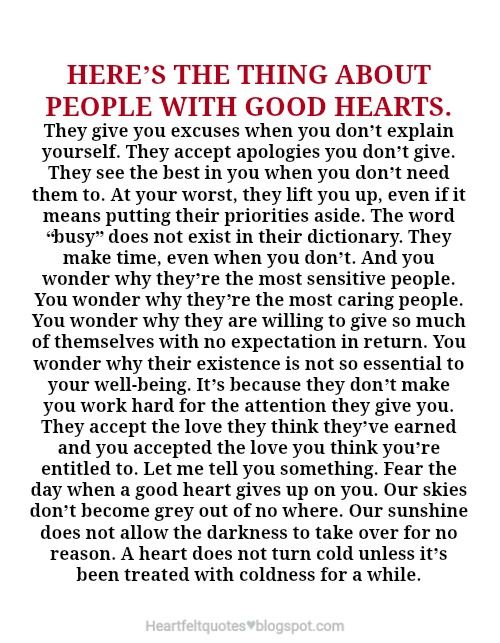 Therefore, the moment of accepting an apology should not be made difficult, unpleasant, filled with shouting and criticism, strengthen the feeling of shame (he should not learn to apologize through shame). In this case, it is enough to hug and use such phrases as: “Nothing, anything happens in life ... The main thing is that we have each other”, “Thank you for apologizing. Now I’m not so offended and I will soon forget all the bad things.
Therefore, the moment of accepting an apology should not be made difficult, unpleasant, filled with shouting and criticism, strengthen the feeling of shame (he should not learn to apologize through shame). In this case, it is enough to hug and use such phrases as: “Nothing, anything happens in life ... The main thing is that we have each other”, “Thank you for apologizing. Now I’m not so offended and I will soon forget all the bad things. - In business communication, as well as in formal, secular and any other, the degree of guilt is important for choosing the optimal answer. If a colleague/partner accidentally left a mug of tea on your desk (that is, he did nothing “criminal”, but feels embarrassed that he unintentionally annoyed you) and apologizes for this, the phrases: “It's okay , the mug didn’t bother me”, “Everything is in order, not a single document was damaged”, etc. In cases where you accept an apology for more significant errors, the same recommendations are relevant as for other communications (see paragraphs with No.
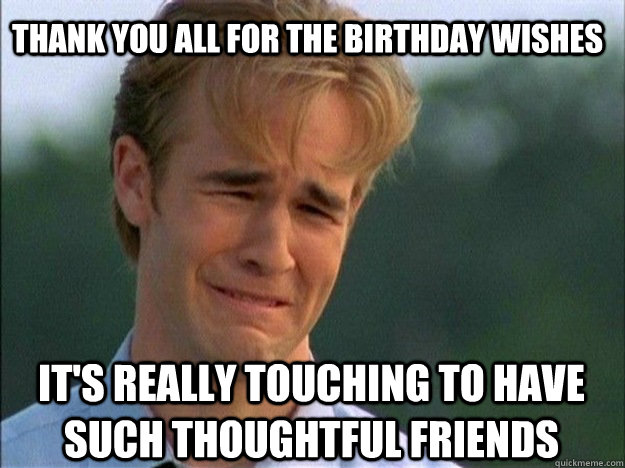 1 to No. 10 of these recommendations), with the only difference that sarcastic, ambiguous phrases are not used as an answer. Sufficient will be neutral, formal answers (without dubious humor, harshness, rudeness, without familiarity), said without malice, with restraint, without unnecessary emotions (for example: “The situation that has arisen is an isolated case in your partnership and, we hope, it will remain so”, “ I propose to decide how we will proceed in the future in such situations, so that we both feel comfortable", "I hope you will do everything possible so that this does not happen again. We will consider the misunderstanding settled").
1 to No. 10 of these recommendations), with the only difference that sarcastic, ambiguous phrases are not used as an answer. Sufficient will be neutral, formal answers (without dubious humor, harshness, rudeness, without familiarity), said without malice, with restraint, without unnecessary emotions (for example: “The situation that has arisen is an isolated case in your partnership and, we hope, it will remain so”, “ I propose to decide how we will proceed in the future in such situations, so that we both feel comfortable", "I hope you will do everything possible so that this does not happen again. We will consider the misunderstanding settled"). - On the day of Forgiveness Sunday, it is enough to answer “God forgave, and I forgive!”, “I give you my forgiveness and I will be glad (a) if you manage to forgive all the grief that I (consciously or unintentionally) caused you (a) ". At the same time, it is not required to remember and list everything you did / said that offended or theoretically could ever offend a person.
